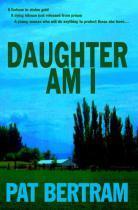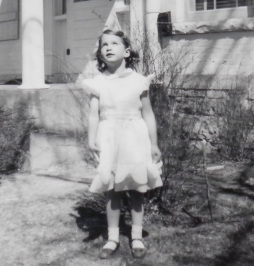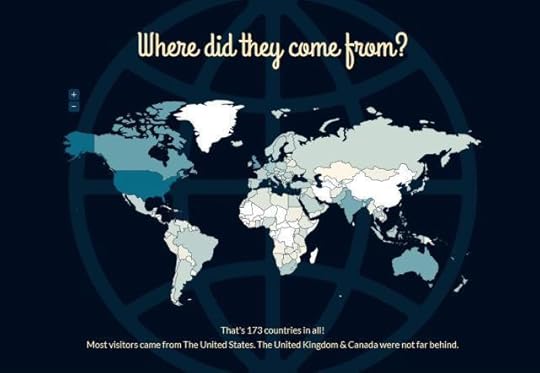Pat Bertram's Blog, page 247
January 8, 2013
Making a Video Blurb
Grief: The Great Yearning is a finalist in the memoir category for the Sharp Writ Book Awards, and I need to put together a 30 second book trailer for their “awards ceremony” video. Thirty seconds isn’t long enough to do a real book trailer, so I’m doing a few photos and text pages — more like a video blurb. I found a thirty second piece of Beethoven’s music — since it’s the last completed piano piece Beethoven ever wrote, it seems fitting — and I have been working on the pages. Do you think these will work? Is it a bit over the top with the title on each page? Do the photos fit with the theme? Any suggestions for improvement?
Tagged: Beethoven's last piano piece, Grief: The Great Yearning, Smart Writ Book Awards, video blurb, video book trailer


January 7, 2013
Is Grief a Medical Disorder or a Part of Life?
 Every once in a while I write a post that really strikes a chord with people, and such a post was The Half-Life of Grief. It’s garnered over 126 shares on Facebook alone, so apparently it’s an important message: grief is not simply emotional, but it’s physical, too. And if it’s physical, then no amount of sublimating our emotions will get rid of the grief. It’s in our very cells.
Every once in a while I write a post that really strikes a chord with people, and such a post was The Half-Life of Grief. It’s garnered over 126 shares on Facebook alone, so apparently it’s an important message: grief is not simply emotional, but it’s physical, too. And if it’s physical, then no amount of sublimating our emotions will get rid of the grief. It’s in our very cells.
This is a message that the American Psychiatric Association doesn’t get. According to the updated Diagnostic and Statistical Manual of Mental Disorders to be released by the American Psychiatric Association, grief is considered a medical disorder, and should be treated as major depression. There used to be a bereavement exclusion in the description of major depression, but they have taken that away, and now more than a few days of pain after the loss of a loved one is considered a crisis. There can be “a few days of acute upset and then a much longer period of the longing, the tearfulness. But typically sleep, appetite, energy, concentration come back to normal more quickly than that.”
As I said in 2010 when I first posted the information about the APA getting rid of the bereavement exclusion: In whose world is grieving a medical condition that needs to be treated? Not my world. In my world, grief is one of the bookends of a relationship. Love. Grief. If grief is a medical condition, then watch out. One day love is going to be considered a treatable disease.
During the past couple of years, there has been a concerted effort by grief counselors, therapists, and other health professionals to rectify this gross misrepresentation of grief, but the American Psychiatric Association is sticking to their decision that grief is a medical disorder.
A medical disorder? For cripes sake, it doesn’t take a fistful of degrees to understand that for the majority of people who have lost someone important in their lives, grief is a completely sane and healthy reaction. So what if grief is hard? Someone we loved dearly is gone from our lives and will never return. What do they expect us to do, just blithely continue with our lives as if nothing important happened? As if the dead had never even existed? As if we’re happy about the situation? And even if we wanted to be joyful despite it all, there is the simple matter that our bodies also grieve, and we’d have physical reactions even if we were drugged into placidity.
I realize that in certain cases people do entertain thoughts of suicide, but those thoughts are part of the grief process. It’s only when people start stockpiling pills or buying guns or starving themselves on purpose that grief might become a medical concern.
Admittedly, some people do manage to continue after a major loss as if nothing happened, and to be honest, I thought I would be one of those people, but death and loss have a way of making themselves felt even in the strong and stoic.
It might seem from these grief posts that I dwell on grief, but I don’t. I dwell on life. And grief is part of life. I understand that. And so should the American Psychiatric Association.
***
Pat Bertram is the author of the suspense novels Light Bringer, More Deaths Than One, A Spark of Heavenly Fire, and Daughter Am I. Bertram is also the author of Grief: The Great Yearning, “an exquisite book, wrenching to read, and at the same time full of profound truths.” Connect with Pat on Google+
Tagged: American Psychiatric Association, bereavement, death, Diagnostic and Statistical Manual of Mental Disorders, grief as a medical disorder


January 6, 2013
Dead Darling From DAUGHTER AM I
Faulkner advised us to kill our darlings, those bits of our novels we love that don’t advance the story. I had way too many darlings in Daughter Am I, but I did steel myself to remove some of them. Today, for your edification, I am posting one dead darling that made it through all the edits except the very last one. You won’t find it in the book (well, except for the last paragraph or two. I wanted to make sure what you read here made sense so I added a bit that was included in the novel).
“The Cleveland Syndicate was dominated by four Jews,” Teach said, “Moe Dalitz, Samuel Tucker, Morris Kleinman, and Louis Rothkopf. An Italian, Chuck Polizzi, and an Irishman, Tommy McGinty, achieved near equality.”
“Chuck Polizzi wasn’t Italian,” Spaghetti said. “His parents were Jews from Russia. When they died, he was adopted by the Polizzi family.”
Teach arched his eyebrows. “I didn’t know that.” Pointedly ignoring Kid Rags’ chuckle, he stroked his chin. “I often wondered how a non-Jew got so high up in that organization. I did know the Polizzis belonged to the Mayfield Road Mob, which became part of the Cleveland Syndicate. While the Mayfield Road Mob, composed of both Jews and Italians, had a reputation for utter ruthlessness, the Syndicate believed the bribe, as a general rule, was more effective than the bullet. Families like the Polizzis, who accepted the new way, lived to become old as well as rich.”
“So how did an Irishman get so high-ranking?” Mary asked.
“Tommy McGinty—Thomas Jefferson McGinty—was the circulation manager for one of the Cleveland newspapers. Contrary to the legend that gangs and gangsters were a product of prohibition, many of the principals of the Syndicate-to-be were assembled and trained in violence years before by the newspapers in their fight for local monopolies. Tommy McGinty and his counterparts on the other newspapers would recruit thugs to beat up their rivals’ employees, particularly the newspaper boys, especially those on lucrative corners.
“In the early prohibition years, McGinty became one of Cleveland’s most powerful bootleggers.
“The Cleveland Syndicate was truly formidable. Moe Dalitz, probably the smartest guy in the business next to Meyer Lansky—”
“You said Johnny Torrio was the smartest,” Mary objected.
“So I did.” Teach smiled at her. “It’s nice to know I haven’t been talking to myself. In point of fact, all three men were smart. Always looking to expand. Always looking for new venues.”
“You sound like you admire those people,” Mary said.
In the silence that greeted her remark, she could hear Spaghetti and Lila Lorraine murmuring softly to each other. Looking around to check on the rest of the group, she noticed that Iron Sam, Crunchy, and Journey all appeared to be sleeping. Kid Rags and Happy were passing the hip flask back and forth. Tim had his head cocked while he drove, as if he were listening for Teach’s response.
“Not at all,” Teach said finally, his voice harsh. “People tend to romanticize prohibition, to romanticize the so-called Mafia, but they don’t get it. It’s about the unholy trinity—criminals, politicians, and businesspersons—all working together to sell out the little people. And make no mistake about it—no matter how rich and successful we might be, the vast majority of us are the little people.”
***
Click here
 to buy Daughter Am I from Second Wind Publishing, LLC.
to buy Daughter Am I from Second Wind Publishing, LLC.
Click here to buy Daughter Am I from Amazon.
Click here to buy Daughter Am I from B&N
Click here to buy Daughter Am I on iTunes
Download 30% of Daughter Am I free at Smashwords .
Tagged: Chuck Polizzi, Cleveland Syndicate, Johnny Torio, Mayfield Road Mob, Meyer Lansky, Moe Dalitz, Morris Kleinman, Tommy McGinty

January 5, 2013
The Half-Life of Grief
 Recently I’ve been coming across a lot of articles and books touting the idea that people don’t need to grieve — it’s detrimental to their happiness and it doesn’t really gain them anything. These writers believe that when sad thoughts enter your mind, you should simply observe them and let them go. They are only thoughts, nothing real, nothing that can hurt you. The same goes for feelings of sadness. Examine them and let them go. In themselves, the feelings have no power. The only power is what you give them.
Recently I’ve been coming across a lot of articles and books touting the idea that people don’t need to grieve — it’s detrimental to their happiness and it doesn’t really gain them anything. These writers believe that when sad thoughts enter your mind, you should simply observe them and let them go. They are only thoughts, nothing real, nothing that can hurt you. The same goes for feelings of sadness. Examine them and let them go. In themselves, the feelings have no power. The only power is what you give them.
Sounds good, right? And to a certain extent this method works. But . . .
First of all, thoughts are real. When you study particle/wave physics and even quantum physics, it’s hard not to believe that at rock bottom, we are all just thoughts. Together, we think our current world into existence. Maybe we even think ourselves into existence. Or perhaps we are thoughts of the eternal Thinker. Who knows, certainly not me. But the point is, thoughts may not be something that can be touched with your fingers, but they are still tangible.
Second of all, grief is important. It’s a way of honoring those who have died, a way of pulling our world around us to accommodate the void they left behind, a way of learning to live with their absence and without their presence, a way of developing into our own person and renewing our reasons for living. Of course, we can develop and renew without grief, but being so familiar with death brings an urgency to the process.
Third of all, not all grief is emotional and mental. Sometimes grief is visceral. Physical. If you have lost a child or a soul mate, you literally lose a part of your physical self. Your child is connected to you by shared genes, and in the case of mothers, a shared body. With soul mates, you are connected by your very being. A lifetime of living together also connects you physically by the air you breathe, the foods you eat, the cellular materials that are exchanged via viruses and microbes, the energy fields that overlap.
One of the reasons such grievous losses as that of a child or a mate are so devastating is that not only do we grieve, so does our body. There were many times I could keep from feeling the loss emotionally or mentally, but I could still feel it in the marrow of my bones, in my cells.
People tell me that it takes three to five years to get past the worst of such a loss. Most people I know woke on their fourth anniversary to find a sense of renewal, and it makes sense that four years would be the half-life of grief. Our cells are continuously dying and being renewed. If it takes seven years for all the cells in one’s body to be renewed, then at my current stage of grief — 2 and 2/3 years — most of my cells still bear his imprint. By four years, less than half my cells will bear his imprint. And so gradually, the physical grief fades.
From the beginning, I was determined to get through my grief as quickly as possible so that I wouldn’t dishonor him (and me) by mourning his death for the rest of my life. I thought I was so strong and emotionally stable that I’d whiz through the process, but that did not happen, partly because I never took physical grief into consideration. I never even knew such grief existed, and neither, apparently, do writers who say that all you have to do to be happy is to let the feelings of sadness pass without feeding them.
***
Pat Bertram is the author of the suspense novels Light Bringer, More Deaths Than One, A Spark of Heavenly Fire, and Daughter Am I. Bertram is also the author of Grief: The Great Yearning, “an exquisite book, wrenching to read, and at the same time full of profound truths.” Connect with Pat on Google+
Tagged: being happy, grief and happiness, half-life of grief, loss of a child, physical grief, the reality of thoughts, thoughts

January 4, 2013
Believing Impossible Things
 In an effort to see life in a new light, I’m going try to believe impossible things. I’ve always wanted to know the truth, but grief has thrown so many of my perceptions out of whack that I don’t know the truth of anything any more, so I’ve decided to believe things that are untrue. For example, I’m going to believe I am at the perfect weight. And maybe that’s the truth. Who’s to say? Only me, and I’m not talking.
In an effort to see life in a new light, I’m going try to believe impossible things. I’ve always wanted to know the truth, but grief has thrown so many of my perceptions out of whack that I don’t know the truth of anything any more, so I’ve decided to believe things that are untrue. For example, I’m going to believe I am at the perfect weight. And maybe that’s the truth. Who’s to say? Only me, and I’m not talking.
And hey. Why stop at weight? Maybe I’ll believe that I myself am perfect. Now that I think about it, that is the truth. Since I am the only me in the world, whatever I am is perfectly me.
I’ve always been very self-aware — knowing both my good points and my bad points, my successes and failures — but if the universe is unfolding as it should be and I am where I am supposed to be, then there can be no good points and bad points. There can be no successes and failures. There is just me, a creature born of stardust, the culmination of billions of years of creativity and change. Odd to think that I (well, all of us) are a part of this process.
Maybe we are the process.
This thing called grief has given me an interesting perspective on life. A day or two after my life mate died, I couldn’t visualize him, so I looked at the only photo I have of us, and I wept because I did not recognize him. When that photo was taken, it was an exact likeness of him, but during the subsequent years of illness, he lost the fullness in his face, first becoming distinguished looking, then gaunt. When he died, I an idea/image of him in my mind, perhaps a composite of him through the years, perhaps what he actually looked like near the end, and that single photo I have of him does not resemble the person I knew. Now, however, the photo is how I remember him since it’s the only image of him I have. (Occasionally I can remember his smile or the way he looked when he died, but mostly he has faded from memory.) The way he looked in the photo and the way he looked at the end are both parts of his process, so I’m content remembering him when he was still relatively young and healthy.
It’s not just our internal images of a person that changes to accommodate the vagaries of age; our internal image of the relationship itself changes to accommodate the vagaries of life. Most of the transformation of a relationship from youthful and passionate to aged and (perhaps) wise and companionable goes unnoticed. We are always who we are. We are always in the present.
In other words, we are a process. Do we have an existence beyond the process? Someone told me recently that we can’t prove we exist. Maybe this is why we can’t prove it — whatever we try to pin down is already gone, lost in the past.
I never had much use for photographs of myself, but after my mother died, I inherited a bunch of photos taken of me when I was young. I put them in an album and I leaf through it occasionally, seeing the progression of myself from a baby to a young woman, trying to figure out what those girls have to do with the me of today. I’ve always felt like just me, and yet, (for example) I cannot remember this little girl in the photo, cannot remember being her. She has receded far into my past. Or perhaps she’s become subsumed into my current persona. Either way, she no longer exists even in memory.
But she is part of the process of me.
(Hmmm. Maybe there is something to this idea of believing impossible things. I’ve already found one new way of looking at life.)
***
Pat Bertram is the author of the suspense novels Light Bringer, More Deaths Than One, A Spark of Heavenly Fire, and Daughter Am I. Bertram is also the author of Grief: The Great Yearning, “an exquisite book, wrenching to read, and at the same time full of profound truths.” Connect with Pat on Google+
Tagged: believing impossible things, born of stardust, life as a process, seeing life in a new light, the process of living, unfolding universe

January 3, 2013
Grief: New Year’s Day and Beyond
 This past New Year’s Day was the third one I have lived through since the death of my life mate/soul mate. That first New Year’s Day was one of relief. I’d managed to live through the worst year of my life, and I greeted the day with acceptance and looking toward the future, building hopes and creating dreams.
This past New Year’s Day was the third one I have lived through since the death of my life mate/soul mate. That first New Year’s Day was one of relief. I’d managed to live through the worst year of my life, and I greeted the day with acceptance and looking toward the future, building hopes and creating dreams.
The second New Year’s Day was a day of dread. The last week of that year was one of waiting. No grief, no strong emotion. Just . . . waiting. But with the dawning of the new calendar year came the dread. I still don’t know why (to be honest, I’ve never totally understood the whys and ways of grief), though perhaps the dread came from an awareness of moving further away from our shared life. I could no longer say, “Last year, we . . .” “Last year, he . . .” There was just me, balanced precariously on the precipice of a life alone.
This third New Year’s Day inexplicably began with tears. Grief had been leaving me alone, and I hadn’t had a strong upsurge for a long time — I thought I was through with grief, to be honest — but when the calendar rolled over from 2012 to 2013, grief came calling once again. And once again, I do not know why.
A new calendar year has never meant much to me — it’s such an arbitrary date, beginning at staggered times around the world, and even celebrated on different dates in various countries and religions. Now that I am alone, however, I try to make a ritual of such things, to note the passing of the days. I need to know that I am still here and I am still alive. And despite the arbitrariness of the date, apparently something in me senses a change from one year to the next and reacts to it.
People tell me that it takes three to five years to find joy in life again, or at least to find a new beginning, and three months into this year will be my third anniversary of grief. It feels like a milestone, though I can’t even begin to guess what it will mean to me besides one more year further away from “us” and one more year closer to . . . I don’t know what.
But I can’t think of that now. If I’ve learned anything during these past two years and nine months, it’s the importance of taking life one step at a time. I’ve already taken three steps into this new calendar year. Tomorrow will be another step. Beyond that, the future will just have to take care of itself.
***
Pat Bertram is the author of the suspense novels Light Bringer, More Deaths Than One, A Spark of Heavenly Fire, and Daughter Am I. Bertram is also the author of Grief: The Great Yearning, “an exquisite book, wrenching to read, and at the same time full of profound truths.” Connect with Pat on Google+
Tagged: death of a soul mate, grief and loss, joy after grief, New Year's Day, New Years and grief, third anniversary of grief

January 2, 2013
All Right With Death?
 A friend who lost her husband sent me an email today, relating something a woman told her. The woman said, “I’m not trying to put anything bad on my husband, but I think that if he died I would be all right with that.”
A friend who lost her husband sent me an email today, relating something a woman told her. The woman said, “I’m not trying to put anything bad on my husband, but I think that if he died I would be all right with that.”
The statement shocked my friend, not just because of the tactlessness, but because of the lack of feeling.
People have said the same thing to me, and to be honest, it’s the way I felt when my life mate/soul mate was dying. I truly thought I would be okay. He’d been sick for so long and in such pain, I thought I’d be relieved when he died. And I was. For about an hour. Those last years of his life, I did many things to prepare myself for going on alone, and I thought I was prepared. That’s why my grief shocked me so much — it came from somewhere so deep inside, I had no idea such a place existed. My grief was beyond rationality, beyond emotion. It was visceral, as if part of my body and half my soul had died.
Some women truly don’t feel much after their husbands die. Sometimes the husband had been sick for so long they did their grieving before he died. Sometimes their relationship was so bad they were glad when it was over. And sometimes people are unable to feel anything. After all, about 5% of all humans are sociopaths — not killers, simply people without human emotions.
But the woman who made the remark could also be in denial, or not know the power of grief. If you know how you would feel if your spouse died, it would put an unbearable burden on you, especially if you think you are an independent woman. I mean, grief to such an extent as I felt seems anachronistic in this liberated day when we are all supposed to be strong and self-reliant. When people found out about my loss, they often gave me strange looks, as if I were an alien species they could not understand. Sometimes after such a look, people would said they could not imagine how they would feel if they lost their spouse. I always told them not to imagine it. They couldn’t. Until you have been there, you do not know the depths of such grief. You cannot know.
To be honest, I wish I didn’t know. Such grief changes your whole perception of yourself and your relationship to life. It makes you rethink who you are, where you came from, and where you are going, and there are no easy answers. The truth is, I was strong and self-reliant. Sure, my mate and I did everything together, but I was perfectly capable of doing things on my own. Still, 2 and 2/3 years after his death, I am struggling with feelings of pointlessness and meaninglessness, as if our shared life was the only thing that mattered. And maybe it was — then. For thirty-four years he was the focus of my life, and to a certain extent he still is. I feel his absence the way I once felt his presence.
For me, the strangest part of the woman’s sentence is her implication that not only would she be all right after he died, but she’d be okay with his death. In my case, I am mostly doing okay dealing with my mate’s absence. I can even accept the idea that he is dead — I have to so I can go on with my life. But as long as I am alive, I will never be all right with his death.
Tagged: being all right with death, death of a spouse, dying, giref after two years, grief and independence, power of grief


January 1, 2013
Facing Off With Facebook
 Yesterday’s accidental New Year’s resolution was to spend less time promoting books I don’t like and would never read by authors I don’t know. (For the past few years, I’ve been posting book excerpts from any author who sent me one, and then promoting it via Twitter and Facebook.) Today’s accidental resolution is to spend less time on Facebook. This resolution isn’t accidental — I’ve been giving a lot of thought to where I want to go with my online life. What’s accidental is the timing. What was supposed to be simply a resolution has accidentally become a New Year’s resolution.
Yesterday’s accidental New Year’s resolution was to spend less time promoting books I don’t like and would never read by authors I don’t know. (For the past few years, I’ve been posting book excerpts from any author who sent me one, and then promoting it via Twitter and Facebook.) Today’s accidental resolution is to spend less time on Facebook. This resolution isn’t accidental — I’ve been giving a lot of thought to where I want to go with my online life. What’s accidental is the timing. What was supposed to be simply a resolution has accidentally become a New Year’s resolution.
Like many authors, I joined Facebook as a way of promoting my books, and I “friended” as many people as possible to get the word out. When I realized I wasn’t getting the results I’d hoped for, I started going for quality — trying to get to know the people I was connected with. That worked to a certain extent — I’ve met wonderful people and have had interesting discussions with them — but now the site has lost its luster. Or maybe I am growing beyond what the site has to offer. I never did like the games that keep so many people occupied, but I liked the feeling that something was always going on, that there was always a chance for an incredible encounter.
A growing problem is that for me there are two Facebooks running concurrently. There is the professional side, where I meet and connect with other authors, and there is the personal side. I’ve tried separating out the two — I have both a personal profile and an author page — but I’m still connected to more than a thousand people on my personal profile that I don’t know, and the constant flow of their personal tragedies and triumphs is beginning to weigh me down.
I don’t know which is worse — the brags about how many books people have sold, how many pages they have written, what awards they have won, their ratings on Amazon, or the announcements of anniversaries, illnesses, hospitalizations, accidents, and deaths of relatives and pets. (Actually, I do know what is worst — the happy announcements of wedding anniversaries. They remind me of what I have lost.)
I sound curmudgeonly, don’t I? In a cosmic sense, what happens to each person affects us all, but in a microcosmic way, knowledge of these events can add an immeasurable burden. Yes, I’m glad of people’s triumphs. (Or at least I want to be.) Yes, I’m sorry about their tragedies. But how do my feelings make a difference to their lives? I’m a stranger to them as they are to me. And if I turn off my computer, they no longer exist. (Ah, such power!)
I can’t completely get rid of Facebook, nor do I want — it’s a good way of connecting with people and getting to know them — but I can curtail my time on the site, and that I will do.
***
Pat Bertram is the author of the suspense novels Light Bringer, More Deaths Than One, A Spark of Heavenly Fire, and Daughter Am I. Bertram is also the author of Grief: The Great Yearning, “an exquisite book, wrenching to read, and at the same time full of profound truths.” Connect with Pat on Google+
Tagged: accidental New Year’s resolution, book promotion, Facebook, New Year's resolution, using Facebook


December 31, 2012
An Accidental New Year’s Resolution
 When I first got the internet in 2007, I embraced it as if it were a wonderful new friend. At the time, my mother was dying and my life mate/soul mate was sick. There was nothing I could do about either of those circumstances, and the internet gave me a place to escape from my real life.
When I first got the internet in 2007, I embraced it as if it were a wonderful new friend. At the time, my mother was dying and my life mate/soul mate was sick. There was nothing I could do about either of those circumstances, and the internet gave me a place to escape from my real life.
The terrible times continued. My mother died, then three years later, my soul mate died, and one of the few ways I could escape from the grief was to spend time online. (Screaming also helped alleviate the grief, but being online was so much easier on my throat.) I moderated writing groups, connected to thousands of people, dived headfirst into blogging. I used a couple of my blogs to promote other authors because . . . well, because the blogs were there and it seemed like the right thing to do.
Several unsettling incidents happened recently that made me rethink what I’m doing here. These incidents didn’t amount to much. A contretemps over an excerpt someone wanted me to post. The discovery that a terrible writer I know who writes awful books is making a fortune. A discussion about talent vs. persistence (the writers almost all believe that talent is most important, which depresses me — are writers really so arrogant in their belief of their talent?).
The truth is, except for this blog, I’m not having any fun online. I seem to have fallen into an alternate universe of self-published writers. I’m even getting known as a promoter of self-published writers, but I find this new world of publishing very discouraging. Most of the excerpts I post on my blog are not well written or are excerpts from books I’d never read if they were the last books left on this earth. And that’s saying a lot since once I read everything that fell into my hands. So why am I promoting such books? I no longer know.
It used to be that self-published writers were iconoclasts, following a dream at any cost. Now so many self-published writers are conformists, following a dream at no cost. Even worse, they are a militant lot, demanding regard for no apparent reason. I have become friends with numerous self-published writers in an online sort of way, and I know that many are good at the craft and strive to get better, but just as many self-publishers dash out a book in a month (sometimes even in a week) and expect to be taken seriously.
To be honest, I have no regard for most of the authors published by the big six, either, so this isn’t a self-published vs. traditional-published discussion. It’s about me. I am not self-published, though many people assume I am (guilt by association). Nor am I published by a major publishing company. It used to be that authors who were published by small independent presses were called “indie authors” but self-publishers have adopted that name for themselves, so now there is no name for us.
In my case, it no longer matters what kind of author I am since I am not writing much fiction. Being around so much bad writing and so many self-aggrandizing writers has stifled any urge I might have to contribute words of my own.
So, to save my sanity, I’ve decided to escape from my online life. I’m going to keep up this blog, of course, but I’ll be cutting back on other online activities, especially those that involve promoting authors I don’t know and don’t like.
This resolution isn’t accidental — I’ve been giving a lot of thought to where I want to go with my online life. What’s accidental is the timing. What was supposed to be simply a resolution has accidentally become a New Years resolution.
***
Pat Bertram is the author of the suspense novels Light Bringer, More Deaths Than One, A Spark of Heavenly Fire, and Daughter Am I. Bertram is also the author of Grief: The Great Yearning, “an exquisite book, wrenching to read, and at the same time full of profound truths.” Connect with Pat on Google+
Tagged: escape fom the internet, escape into the internet, New Year's resolution, promoting other authors, self-published writers


December 30, 2012
2102 Year in Blogging Annual Review
I received my 2102 Year in Blogging Annual Review from WordPress today. According to WordPress:
19,000 people fit into the new Barclays Center to see Jay-Z perform. This blog was viewed about 77,000 times in 2012. If it were a concert at the Barclays Center, it would take about 4 sold-out performances for that many people to see it.
In 2012, there were 365 new posts, growing the total archive of this blog to 1,099 posts. There were 358 pictures uploaded, taking up a total of 53 MB. That’s about 7 pictures per week.
The busiest day of the year was December 3rd with 1,683 views. The most popular post that day was Thirty-Two Months of Grief.
These are the posts that got the most views in 2012 (Some of your most popular posts were written before 2012. Your writing has staying power! Consider writing about those topics again):
Sex With Sister Tips. Um…Yeah (July 2009)
Describing a Winter Scene (February 2008)
How Many Books Are Going to be Published in 2012? (Prepare for a Shock) (April 2012)
Describing a Scene in an Interesting Way (November 2007)
(December 2008)
The top referring sites in 2012 were:
wordpress.com
facebook.com
dsync.blogspot.com
twitter.com
36ohk6dgmcd1n-c.c.yom
The top commenters were:
Rami Ungar The Writer
Joylene
Rod Marsden
Visitors:

***
Pat Bertram is the author of the suspense novels Light Bringer, More Deaths Than One, A Spark of Heavenly Fire, and Daughter Am I. Bertram is also the author of Grief: The Great Yearning, “an exquisite book, wrenching to read, and at the same time full of profound truths.” Connect with Pat on Google+
Tagged: 2102 Year in Blogging Annual Review, WordPress



![video[1]](https://i.gr-assets.com/images/S/compressed.photo.goodreads.com/hostedimages/1381886509i/5380031._SX540_.jpg)
![video[2]](https://i.gr-assets.com/images/S/compressed.photo.goodreads.com/hostedimages/1381886509i/5380032._SX540_.jpg)
![video[3]](https://i.gr-assets.com/images/S/compressed.photo.goodreads.com/hostedimages/1381886509i/5380033._SX540_.jpg)
![video[4]](https://i.gr-assets.com/images/S/compressed.photo.goodreads.com/hostedimages/1381886509i/5380034._SX540_.jpg)
![video[5]](https://i.gr-assets.com/images/S/compressed.photo.goodreads.com/hostedimages/1381886509i/5380035._SX540_.jpg)
![video[6]](https://i.gr-assets.com/images/S/compressed.photo.goodreads.com/hostedimages/1381886509i/5380036._SX540_.jpg)
![video[7]](https://i.gr-assets.com/images/S/compressed.photo.goodreads.com/hostedimages/1381886509i/5380037._SX540_.jpg)
![video[8]](https://i.gr-assets.com/images/S/compressed.photo.goodreads.com/hostedimages/1381886509i/5380038._SX540_.jpg)
![video[9]](https://i.gr-assets.com/images/S/compressed.photo.goodreads.com/hostedimages/1381886509i/5380039._SX540_.jpg)


